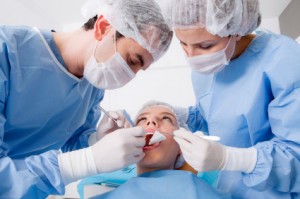 Understanding sleep apnea
Understanding sleep apnea
So first, let’s understand the problem. Your not-so-well-rested sleep partner is often the first line of defense against sleep apnea—a common and treatable breathing disorder of which millions of Americans suffer. It sounds like a loud snore, but an “apnea” is a little more serious than that. It can cause significant impacts to your medical health and dental health because it’s the literal stopping of one’s breath due to an obstructed airway, commonly caused by collapsing or weak airway muscles, having an oversized tongue, being overweight, or having a misaligned jaw.
Common symptoms of sleep apnea your bed-sharing person might notice include:
- Reduced and absent breathing
- Frequent and loud snoring
- Gasping for air during sleep
Common symptoms of sleep apnea you might notice include:
- Dry mouth and headaches upon waking
- Nocturia (waking up often during the night to urinate)
- Excessive daytime drowsiness
- Drinking multiple cups of coffee
- High blood pressure
- Migraines
- Irritability and mood swings
- Bags under eyes
Common symptoms of sleep apnea both you and your bed-sharing person might notice include:
- Sexual dysfunction and/or decreased libido
Sleep apnea and its dental symptoms
Although a formal medical diagnosis of sleep apnea is made by a physician and a sleep specialist, dentists—and sleep partners—have long been the first to identify likely cases of sleep apnea. That’s because of its high correlation with particular dental health issues, like TMJ and bruxism. Other dental and mouth characteristics are common in people with sleep apnea, too. Those include a very deep bite, crowded teeth, scalloped tongue, narrow dental arches, and a high arched palate.
TMJ
The data is becoming more and more clear that TMJ (temporomandibular joint) disorders and sleep apnea are highly correlated. A study in the Journal of Dental Research found people with risk factors for sleep apnea were three times more likely to suffer from a TMJ disorder.
Symptoms of a TMJ disorder include:
- Pain in the jaw, head, neck, and shoulders
- Problems chewing
- Clicking or grinding sounds in the jaw
- Locked jaw
Bruxism
Bruxism is simply a fancy name for grinding the teeth or clenching the jaw, which most commonly happens during sleep. It affects your sleep enough to cause you to wake up feeling unrefreshed and sometimes with a headache or neck and jaw pain. Some research suggests bruxism is the cause of poor sleep and damaged teeth in 31% of adults, most of whom have sleep apnea.
It’s hard for you to know if you suffer from bruxism, but your dentist can discover evidence during a cleaning and exam. The clues include:
- Loose teeth
- Eroded tooth surfaces
- Cracked, chipped, and broken teeth.
Mouth Breathing
If your lover calls you a “mouth breather” one day, you may want to show him or her the door. If your dentist talks to you about breathing through your mouth, listen up. Sleep apnea causes a person to breathe through the mouth and it can result in:
- Dry mouth
- Tooth decay
- Plaque
- Mouth sores
- Gingivitis
- Periodontal disease
The correlation between sleep apnea and gingivitis and/or periodontal disease is strong. Research reported in the Journal of the Indian Society of Periodontology says more than 62% of people with sleep apnea have periodontal disease and more than 34% have gingivitis.
Defending against sleep apnea
The solution to sleep apnea also comes from the mouth. More specifically, it comes from the conversation between you and your dentist. He or she knows what to ask about when it comes to your sleep. And if your responses and the evidence from your dental health indicates a possible case of sleep apnea, your dentist will make some suggestions and referrals.
While the traditional sleep apnea solution involves going into a brick and mortar sleep lab where a sleep tech monitors and analyzes your sleep, there are other and more convenient ways to diagnose the issue. Even more exciting, the treatment that uses those traditional clunky masks that force air into your mouth and nose (called continuous positive airway pressure devices or CPAPs) are becoming part of the past, too. Just like your snoring.







Leave a Reply